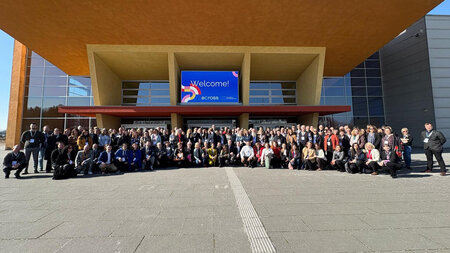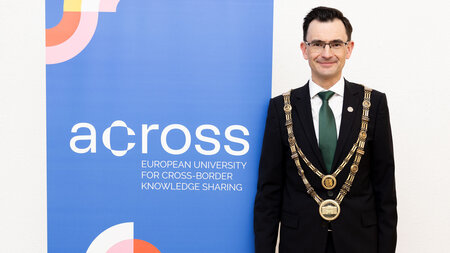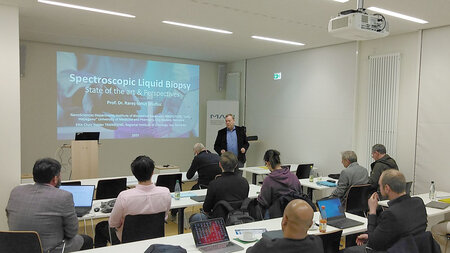Using New Media for Stronger Democracy?
Prof. Babatunde Opeibi from Nigeria researches at the Professorship of English Language and Linguistics on the role of new media in politics as a Fellow of Alexander-von-Humboldt-Foundation
-

Prof. Babatunde Opeibi (r.) from Nigeria and Samuel Ngwa Atechi (l.) from Cameroon both are Fellows of Alexander-von-Humboldt-Foundation at the Professorship of English Language and Linguistics of Prof. Dr. Josef Schmied. Photo: private
Since March 2014 the Professorship of English Language and Linguistics has an international support from Nigeria. Prof. Babatunde Opeibi from the University of Lagos is a Fellow of Alexander-von-Humboldt-Foundation, who will conduct a research on the usage of new media in politics for twelve months at TU Chemnitz.
Before coming to Germany, Prof. Opeibi has done some research on political communication and the role of language in election campaigns and governance in Nigeria. While on his research stay at TU Chemnitz, he studies the relationship between new media and civic engagement; and deals with the similarities and differences of political communication in Western democracies and Nigeria. "Of course the primary goal of politicians is to be elected. This is similar in every country. However, the use of language by politicians to convince people, and in the media differs a lot. Unlike in Germany, new media in Nigeria is beginning to play a particularly important role,” says Opeibi and adds: "Here at TU Chemnitz I have a better access to current journals, e-books and a more reliable internet service, which are of immense benefit to my research work. Nigeria can learn a lot from Western democracies and the use of new media in politics.”
Prof. Opeibi has travelled over the world, America, Canada, Qatar, UAE are some of the places he has visited, and the UK, where he studied for three months at the University of Westminster in London as a Commonwealth Fellow. "As my family and I are used to be on the move a lot, we always adapt very quickly, and German food tastes good,” says Opeibi. Nevertheless, some of our typical Nigerian food is also cooked at home. However, we missed ‘Gari’, a typical Nigerian meal made from cassava powder and water.” Before Prof. Opeibi came to Chemnitz, he learned German in a four-month language course in Dresden. "My first sentence in German was `Wie geht`s?´. Meanwhile, I have learned a lot. The time we spent in Dresden was very interesting and exciting, but also in Chemnitz we feel very much at home, and we have made many new friends,” said Opeibi.
The Nigerian-born, Prof. Babatunde Opeibi is not the only international researcher at the Professorship of Prof. Dr. Josef Schmied. One of his colleagues (a Humboldt Fellow) comes from the University of Yaoundé in Cameroon, and three doctoral scholars from Africa, i.e., Ghana, Nigeria and another one from Tanzania. "Prof. Schmied is an open-minded person, and I am very thankful to him and TU Chemnitz for having an opportunity to conduct my research here in Chemnitz. We have an excellent relationship, and there will be mutual benefits from the intercultural exchange and collaboration,” said Opeibi.
After the end of the research year, Prof. Opeibi will return to Lagos and pass on his experience to his colleagues and students as well as the political community. The Alexander-von-Humboldt-Foundation includes another six-month stay at the host university after two years at the home university. "I would be delighted to be able to visit TU Chemnitz one more time,” said Opeibi.
(Author: Damaris Diener, Translation: Nataliia Boiko)
Katharina Thehos
10.04.2014





